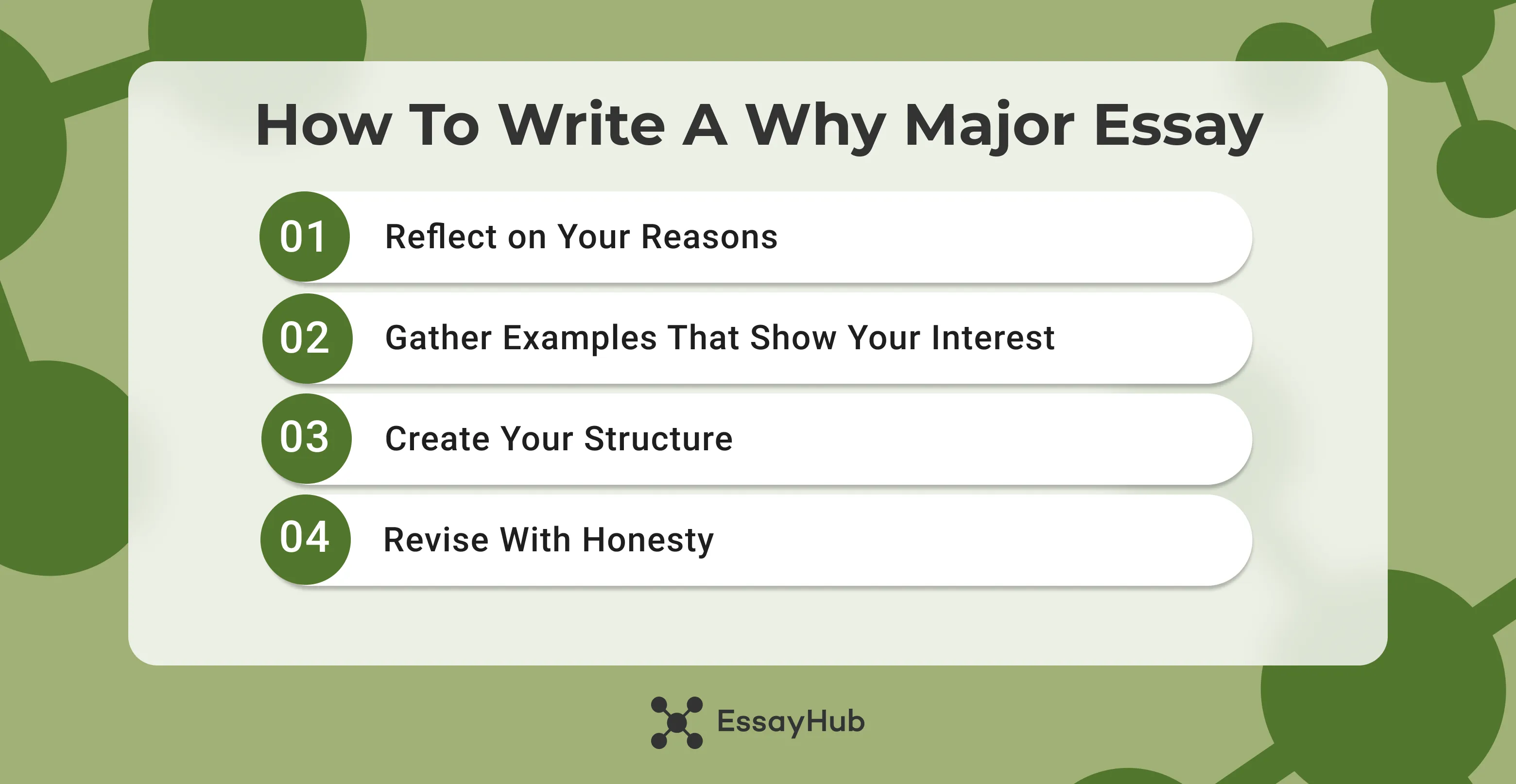A college major feels permanent. That’s why high school seniors stress so much when they have to choose which field to commit their lives to. They describe their reasoning for choosing a certain path in the “Why This Major” essay. This piece of writing helps admissions officers understand more about applicants.
This article will show you several Why This Major essay examples so you know what strong writing for college looks like. And if you’ve caught yourself thinking, ‘who can write my essay for me?’ That's more than normal. Between so many deadlines and so much stress, you can always rely on EssayHub to take over some of your assignments.
What is the ‘Why Major Essay’?
A Why This Major essay shows what admissions officers look for when students explain their choice of field. The essay helps a school understand how you’ve connected with a subject and why you believe it belongs in your future.
Look at the difference yourself: “I want to study biology’ is a declaration that says nothing about you. A full essay where you explain, for example, what drew you towards biology in the first place, is already a personal story.
A strong essay often includes:
- Personal connection – the first time a topic caught your attention.
- Academic link – a class or project that built on that curiosity.
- Career vision – a sense of how the major will carry forward.
- Fit with the school – a detail about why this program feels right.
Colleges use the essay as a filter. They want proof you’ve thought past surface answers. A Why This Major Essay Example shows how students connect their curiosity with action and point toward an authentic path. The best ones sound alive with thought rather than rehearsed or overpolished.
Why Major Essay Examples
Let’s take a look at a few real examples of Why Major essays so you know exactly what it takes to write a strong one.
Finding Direction Through Psychology
I chose psychology because I’ve always paid close attention to how people respond to stress and change. During my first year of high school, I noticed how classmates struggled with anxiety before exams. Instead of brushing it aside, I wanted to understand what drove those reactions. That curiosity grew after I joined a peer mentoring group where students supported each other through academic and personal challenges.
What excites me most about psychology is the practical use of research in daily life. A lesson on cognitive behavioral therapy showed me how structured strategies can improve focus and reduce anxiety. I applied one technique before my history presentation, and it worked. That moment helped me see how theories can guide real progress.
I also believe psychology aligns with my long-term plan. I want to work in mental health counseling, especially for young people. Many students carry pressure they never name out loud, and I want to provide a space where those feelings can be addressed directly. This major gives me both the science to ground my work and the communication skills to connect with people in a meaningful way.
The program at your university feels like the right environment. Courses on developmental psychology and access to research labs will allow me to test ideas while learning from faculty whose work shapes the field. I am ready to commit my energy and focus to this path.
Why This Works: What makes this “Why Major” essay strong is how it ties the student’s life to their academic choice. You see the spark of interest, then you watch it build through small but telling moments: mentoring peers, testing out a therapy method before a presentation. Those details make the story feel more real. The structure also helps: each part moves the reader forward, from the first glimpse of curiosity to the clear plan for the future. Mentioning the university’s courses and labs shows effort went into research, not just broad statements. It feels personal and convincing.
Building Ideas Through Computer Science
I decided on computer science because I’ve always been curious about how things operate behind the screen. When I was fourteen, I built a simple calculator using an online tutorial. The code barely worked, but the moment I saw the numbers respond to my input, I felt a rush I hadn’t experienced in any other subject. That curiosity pushed me to take an AP Computer Science course where I learned how algorithms influence everyday decisions, from search results to online shopping.
The part that interests me most is problem-solving. Last year, I worked on a group project to design a scheduling app for teachers. It was messy, full of bugs, and frustrating at times. But every fix gave me a clearer sense of how small lines of code can shape bigger systems. That project taught me that coding is collaborative and creative.
Looking forward, I want to specialize in software engineering with a focus on educational technology. I’ve seen how students struggle with outdated tools, and I believe smarter systems could make learning more accessible. The program at your university stands out for its lab spaces and emphasis on real-world projects. Both give me the chance to test my ideas in practice. I’m ready to put in the work because this major feels like the right match for my energy and goals.
Why This Works: This “Why This Major” essay works because it shows progression beyond interest. The student begins with a small experiment, then moves to structured coursework, then a collaborative project. Each step adds weight to the choice of major. The writing avoids vague statements and instead uses specific experiences that prove curiosity turned into action. The future goals connect directly with the program, which signals to the university that the student has done their homework. It’s forward-looking and feels like someone thinking through their path rather than trying to impress with empty lines.
Understanding People Through Economics
Economics caught my attention the first time I read about how small decisions ripple through entire communities. In high school, I joined a debate on rising housing costs in my city. I realized the numbers we were tossing around represented families, choices, and trade-offs. That moment made me want to understand how policies and markets affect people’s daily lives.
I followed that spark into an elective on microeconomics. The supply-and-demand graphs were interesting, but what really stayed with me was learning how incentives shape behavior. I began tracking local business closures during the pandemic and comparing them with reports in the news. The patterns fascinated me. Suddenly, economics wasn’t a textbook subject. It was a lens for seeing the world more clearly.
My long-term goal is to work in economic policy, with a focus on improving access to education and healthcare. I want to use data and research to guide decisions that lift communities. Your university’s emphasis on applied economics and access to public policy internships makes it an environment where I can build both skills and perspective. I’m ready to push myself in this major because it lines up with my curiosity and the impact I hope to make.
Why This Works: This “Why Major” essay shows how personal interest grew into a broader vision. The student begins with a local issue, then links it to classroom study, then moves to independent exploration. Each layer makes the choice of economics feel thoughtful instead of generic. The essay also looks forward, connecting goals with program opportunities. That combination of reflection, evidence of action, and future direction creates a strong balance. It feels grounded in real experience and avoids the trap of being too abstract.
Designing Solutions Through Mechanical Engineering
Mechanical engineering first appealed to me when I joined my school’s robotics club. I wasn’t the most experienced member, but I loved seeing an idea move from sketch to prototype. The first robot I helped build barely made it across the finish line, yet that failure was the spark. I wanted to know why it didn’t work and how to fix it.
I deepened my interest through physics classes, where concepts like torque and energy conservation started to explain the machines I saw around me. Instead of only solving textbook problems, I began taking apart old appliances at home to see how gears and circuits interacted. Each discovery added a layer to my understanding and confirmed how much I enjoyed hands-on work.
Looking ahead, I see myself working in sustainable design. The push for renewable energy and efficient systems needs engineers who can turn theory into reliable technology. Your university’s labs and emphasis on project-based learning feel like the right fit for my goals. I want to build solutions that reduce waste while making technology more accessible. Mechanical engineering gives me both the foundation and the challenge I’ve been searching for.
Why This Works: This Why Major essay brings curiosity and real life action together. The student shows how interest started in a club, expanded in the classroom, and grew further through independent exploration. The details (robotics, physics, dismantling appliances) make the story vivid. The essay also looks ahead to a specific application, sustainable design, and ties that to what the program offers. It’s clear, personal, and convincing because it balances past experience with future direction.
How To Write A Why Major Essay Step By Step
Starting out is often the hardest part, even if you’ve looked at the real examples. That’s why writing a Why Major Essay gets easier when you approach it in stages. Each step builds on the last and gives you a solid structure. You must combine your story with a clear essay writing format so the admissions committee gets the right impression of you.

- Reflect on Your Reasons: Think carefully about why the subject matters to you. Was it a class that sparked your interest or experiences that kept guiding you toward this field? Write down anything that surfaces, even rough ideas.
- Gather Examples That Show Your Interest. Look back at specific projects or courses where your curiosity became real. Be ready to explain what you learned from them.
- Create Your Structure. Shape your ideas into a simple outline. Follow this structure: an introduction that sets your motivation, body paragraphs that speak of experiences, a section that links goals to the major, and a conclusion that leaves a strong impression.
- Revise With Honesty. Read your draft aloud and cut anything that sounds like filler. Replace vague statements with specific details. Authentic writing makes your Why Major essay both believable and memorable.
Beginning The Writing Process
The strongest Why Major essay examples begin with preparation. You can’t explain your choice of major clearly until you’ve sorted through the experiences and reasons behind it. That reflection turns the essay into something only you could write.
- Research the program. Look past the homepage. Read course descriptions, scroll through faculty bios… Maybe even skim student testimonials. That kind of specific knowledge gives you more material to work with.
- Collect notes and evidence. Pull out old assignments, projects, or experiences that reveal your interest in the given field. Keep them close. They’ll anchor your essay so you don’t drift away while writing.
- Set goals for tone and focus. Ask yourself how you want to sound: curious, ambitious, determined. Set that intention before you type a word. That intention keeps your voice steady once you begin drafting.
If college preparation is taking your attention away from your final school assignments, you can always order essay from EssayHub to stay on top of your deadlines.
What Mistakes To Avoid In Why Major Essay
Even the strongest students trip up on common errors when writing this piece. A why major essay only works if it’s connected to both you and the program. These are the mistakes that make admissions officers instantly put your essay aside:
1. Being Too Vague
General lines like “I’ve always loved science” don’t tell anyone much. A why major essay should move past broad claims and into personal details. Show how your interest started and where it grew. Then, explain how you applied that curiosity in your life. The essay will feel hollow without specificity. The admissions officer will want evidence of your thought process, and if you don’t give it, they’ll just assume your decision isn’t well-thought-through.
2. Skipping Research
Colleges appreciate seeing that the applicant has looked closely at their program. Do careful research about the institution and find what stands out to you. It could be a specific course or even a lab you’d love to join. Your essay shouldn’t look like writing that could be sent anywhere. That signals you’re not serious about the school. A Why Major essay that includes research shows commitment and makes your choice more believable.
3. Using Too Much Jargon
Technical words don’t make you sound smarter. It only makes your writing harder to follow. If you overwhelm your Why This Major essay with terms only specialists would understand, it won’t exactly land with the admissions committee. Explain complicated concepts in your own words so they’re easier to follow. If you can’t describe why you love a subject without jargon, it suggests you don’t entirely understand it.
4. Listing Achievements
It’s tempting to fill paragraphs with awards or honors, but that’s not the point of this essay. The application already covers grades and activities. What admissions officers want in a Why Major essay is motivation and reasoning. Listing achievements without tying them to your academic interest comes across as bragging. Show what those experiences taught you instead. That shift turns a list into a story with purpose.
5. Jumping Around
A scattered essay is tough to follow. You might mention a class, then jump to a career goal, then circle back to a club. That lack of flow confuses the reader. The best Why Major Essay Examples keep a clear path: motivation, evidence, and future direction. Stick to a sequence. Organize your points so they build naturally. When your story moves smoothly, the message lands with more weight.
6. Making Big Claims
Saying you’ll “change the world” or “redefine the field” sounds ambitious. It also sounds empty. Big claims without proof weaken the essay. Admissions officers do want to see ambition, but not when it’s unrealistic. Replace exaggeration with curiosity and commitment. A believable story is always better than a flashy promise. That honesty makes your essay stronger.
Why This Major Essay Example: The Bottom Line
A Why This Major essay works best when it feels lived in, not manufactured. You help the admissions committee understand how your interest in a specific field initially started out and what real experiences pushed it forward. The essay ends by showing them where you hope your path takes you.
If the process still feels heavy after reading this article, you can always rely on EssayHub to give you just the right kind of guidance during the college admissions process.
FAQ
What Tone Should I Use?
Use a tone that feels genuine and thoughtful. Aim for professional but personal so you can show both reflection and enthusiasm.
Can I Write About More Than One Major?
Yes, but only if the school allows it. Keep the focus clear and explain why each choice matters to you.
How Long Should A ‘Why Major’ Essay Be?
Most Why This Major essays fall between 250 and 650 words. If you’re unsure about anything, it’s always best to check the application guidelines.
- Essays That Worked. (n.d.). Johns Hopkins University Admissions. https://apply.jhu.edu/college-planning-guide/essays-that-worked/
- Illinois Admissions. (2023, April 18). Apply Like a Pro to Illinois: Examples of Major-Specific College Application Questions - Admissions Blog - University of Illinois Urbana-Champaign. Admissions Blog - University of Illinois Urbana-Champaign. https://blog.admissions.illinois.edu/apply-like-a-pro-examples-of-short-answer-college-application-questions/
- Hamilton College. (2021). Hamilton College. https://www.hamilton.edu/admission/apply/college-essays-that-worked



.png)
.png)

